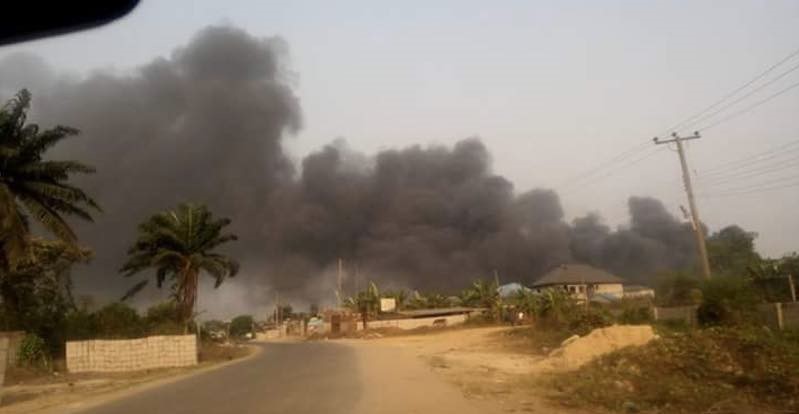Some medical experts and researchers on Thursday, April 24, 2025, appealed to policy makers in developing countries, especially Nigeria, to champion the fight against air pollution, describing it as a “silent killer.”

The experts spoke at the International Summit on Climate Change/Air Pollution jointly powered by the Nigerian Heart Foundation (NHF) and Manchester 1824 of the University of Manchester.
The Summit, which had several panel sessions on air pollution, was held at the Nigerian Institute of Medical Research, Yaba, Lagos.
The theme of the summit was: “Advancing Air Quality Policy through Innovation, Research and Youth Engagement.”
Speaking, Prof. Akin Osibogun, Professor of Public Health, College of Medicine, University of Lagos, said that climate change and air pollution had so many health and environmental implications.
“So, if we understand all this as policy makers we should put in place policies to help to reduce atmospheric pollution, and thereby help protect the health of our citizens.
“That is where we should be going,” Osibogun, who is also an Executive Director with the Non-Communicable Diseases (NCD) Alliance Nigeria, said.
He said that Nigerian citizens needed to know the causes of climate change, its effects, and how to protect their health.
“Our people need to know that climate change affects the respiratory tract causing respiratory diseases.
“It’s affecting the cardiovascular system, so there are cardiovascular diseases, including hypertension.
“And current studies have also shown that atmospheric pollution is related to Diabetes Mellitus and aggravates other non-communicable diseases as well,” Osibogun noted.
According to him, policymakers need to be more proactive in terms of looking at the problem on ground, putting in place policies that relate to the existence of the people, and enforcing the policies.
“It’s not sufficient to ask people not to cook with firewood without providing the enabling environment for them to use alternatives,” he said.
Speaking on vehicle emission inspection, the don noted that policy enforcement should not be used as an avenue to raise revenue, but rather to protect the environment and citizens’ health.
Also, Prof. Obuks Ejohwomu of the University of Manchester, shared a story of a young girl called Ella who passed away at the age of nine because of exposure to air pollutants.
Ejohwomu, a Reader in Sustainable Built Environment and Founder of SQUARE, said the girl lived very near a busy road network.
“This meant that when she was going to school, she was exposed to pollutants. When she entered her house, she was also exposed to pollutants,” Ejohwomu said.
He said that if such could happen in a developed country, only God knew how many lives had been lost to exposure to air pollution in developing countries.
Calling for awareness creation about the dangers of air pollution, Ejohwomu said: “It is a silent killer. Nobody can see it. It’s a new revelation that is dangerous, in fact, one of the major killers in our world today.
“We need to be seen to understand it and react to it immediately. We must act now to put in actions.
“Act now! The evidence is already visible. Evidence is pointing to the fact that air pollution is killing our people,” he said.
Speaking further on climate change and air quality, the expert called for policies to mitigate some challenges of air pollution, even in schools to save the lives of children.
Also, Prof. Chinwe Obuaku, Consultant to Gov. Ademola Adeleke of Osun State on Climate Change and Renewable Energy, advocated rigorous public sensitisation against pollution.
Calling for renewed efforts at planting economic trees, Obuaku said there was the need to inject climate change study in school curriculum.
In his remarks, Dr Kingsley Akinroye, the Executive Director, NHF, called for concerted efforts from all stakeholders – young and old, including the media, to prevent air pollution and climate change.
“People should be discouraged from using firewood and our government should support this initiative. We must have friendly cooking stoves if we don’t have to use firewood.
“We don’t have to use fuel that will produce fumes. Give us clean air through cooking. Let us control vehicle emissions.
Reading the summit’s call to action, Akinroye said countries must adopt the new WHO Global Guidelines on Air Quality, and the policies must be domesticated.
According to him, there is the need for improved air pollution monitoring and modelling, as well as networking in rural and urban areas for accuracy.
Akinroye read: “Countries, multilaterals and philanthropies must create budgets for air pollution solutions and campaign awareness.
“There must be provision of clean domestic fuels and need to move from solid fuel to the use of Liquefied Petroleum Gas and solar panels. There is need also for innovative city designs to curb air pollution.”
By Kemi Akintokun
